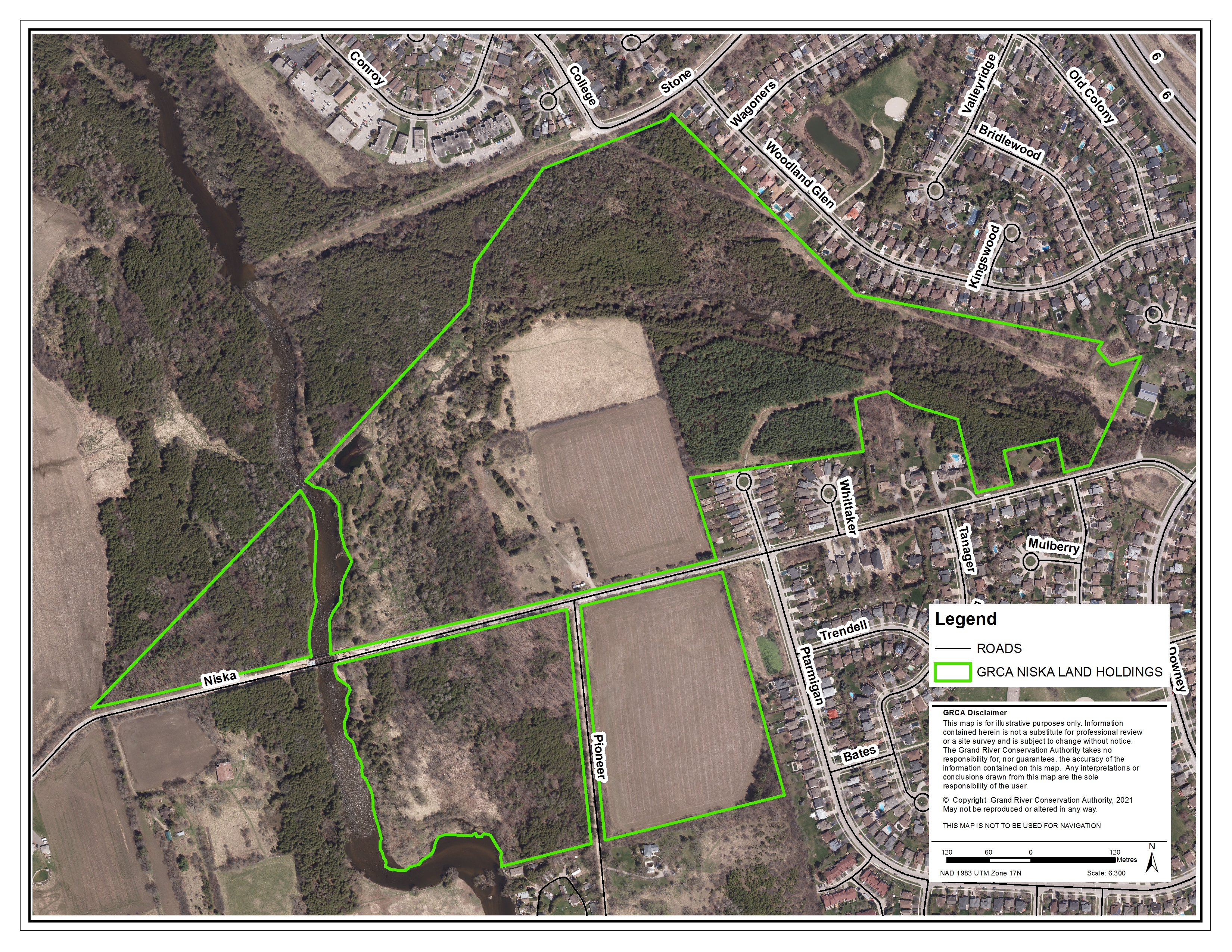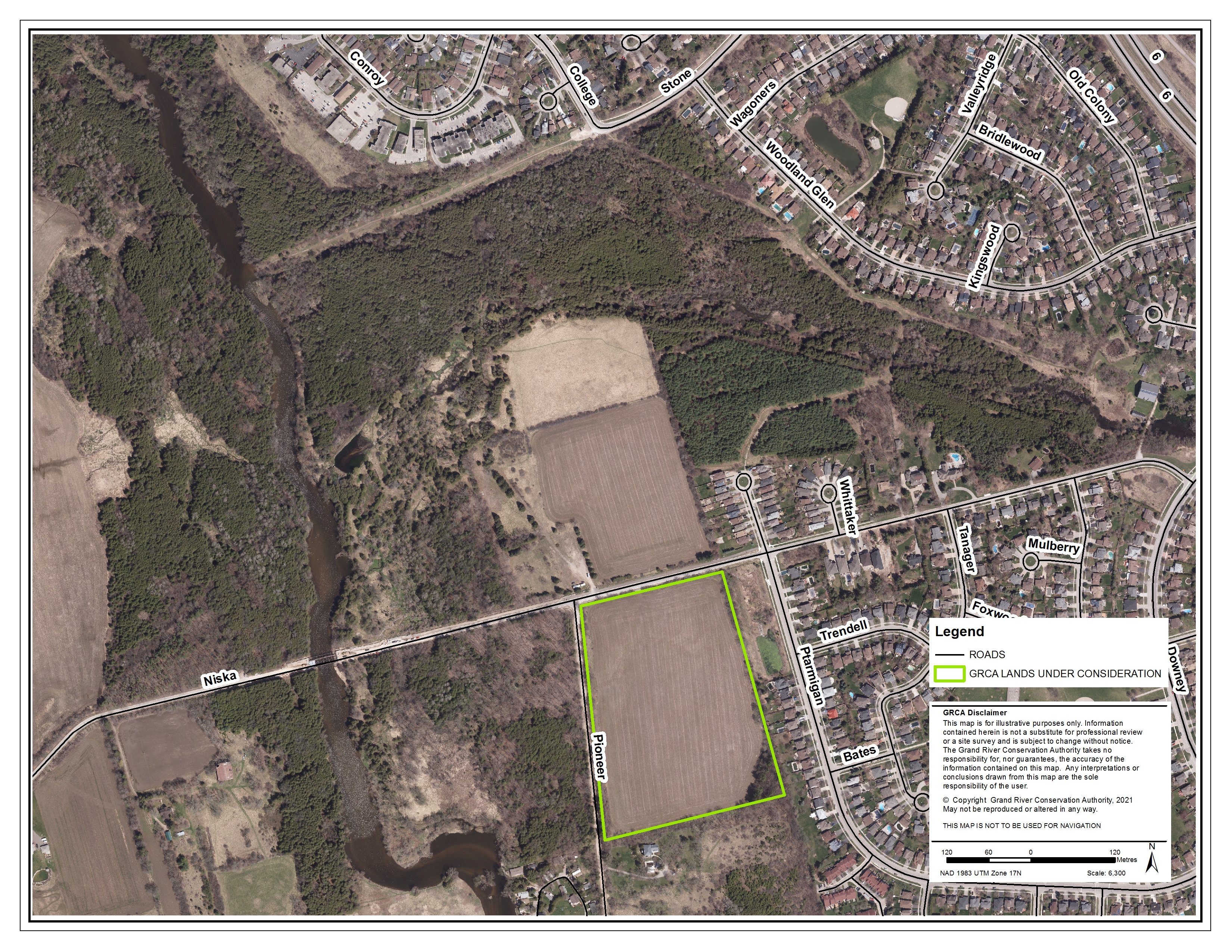Contact(s)
The Niska Land Holdings (Niska) is a natural area, privately owned and managed by the Grand River Conservation Authority (GRCA). Niska straddles the Township of Puslinch and the western side of the City of Guelph. The property is approximately 65 hectares of forests, wetlands, meadows, and agricultural fields, and sits at the confluence of Hanlon Creek and the Speed River.
Niska Land Holdings Management Plan
At its January 26, 2018 General Membership Meeting, the GRCA board passed a motion directing staff to complete a management plan for the entire Niska Land Holdings property. The draft management plan includes information about the property's history, geography, environmental features, historic and current land management practices, mapping and recommendations.
| Management Plan process |
As prescribed in the Minutes of Settlement (1MB PDF), a draft Niska Land Holdings Management Plan must be posted for public comment for at least 30 days.
|
Public comments
The Niska Land Holdings Draft Management Plan was available for a 45 day period between May 11 and June 25, 2023 for public comment. Discussions were also held with the First Nations that were consulted on the draft management plan.
GRCA Board meeting
The report with the recommendation to adopt the Niska Land Holdings Management Plan will be presented at the June 28, 2024, GRCA Board meeting. The proposed final version of the Niska Land Holdings Management Plan and Appendices will be included in the Board meeting package, which will be available on the GRCA website on June 21, 2024, by 4:00 p.m.
Niska Land Holdings background
In 1971, through a report titled Review of Planning for the Grand River Watershed (16MB PDF), it was recommended that the GRCA acquire lands to support the Hespeler Reservoir as a flood control project. In 1971, the GRCA purchased approximately 18 hectares of land on Niska Road in Guelph. Subsequent to that, in 1977, the GRCA purchased an additional 47 hectares from the Ontario Waterfowl Research Foundation (OWRF) in support of the same project. The consolidated land holdings, referred to as the Niska Land Holdings, total 65 hectares and are displayed on the map below.

In 1977, the GRCA entered into a commercial lease with the Niska Wildlife Foundation (NWF) for the management and operation of the existing Kortright Waterfowl Park. The NWF was a charitable non-profit corporation with the primary aim of increasing public awareness of wildlife resources and conservation.
In the 1982 Grand River Basin Water Management Study (6MB PDF), the recommendation for the Hespeler Reservoir (originally proposed in a 1962 Hydraulics Report (10MB PDF)) was removed.
In 2005, the NWF closed the Kortright Waterfowl Park to the public due to lack of funding for the maintenance of the property and safety issues.
In 2014, the GRCA completed the process of terminating the commercial lease with the NWF, and in 2015, the GRCA took back possession of the land.
| Ontario Municipal Board hearing |
|
In 2017, the GRCA was involved in an Ontario Municipal Board hearing, during which an 8-hectare portion of the Niska Land Holdings was included in a list of land use appeals. This 8-hectare portion of Niska is displayed below.
On March 14, 2018, the appeal was withdrawn as part of the Minutes of Settlement (1MB PDF), which require several actions be undertaken by the GRCA. |
Frequently asked questions
| What is the current status of the Niska Land Holdings? |
| Niska is currently closed to the public. Use of the property is limited to the agricultural use of two farm fields. A gate and main entrance into Niska is located on the north side of Niska Road for GRCA operational purposes. An entrance path to the field on the south side of Niska Road is available for the agricultural tenant's exclusive use. There are no other officially recognized access or entry points into Niska and there are no trespassing signs located along the perimeter of the property. |
| What are the GRCA's plans for trails and public access at Niska? |
|
Provided that the Management Plan is approved by the GRCA Board, the GRCA will engage with the City of Guelph to explore opportunities to enter into a maintenance agreement to maintain portions or all of Niska. As noted in the Minutes of Settelement, the City and the GRCA agree to establish a joint working group, which shall include members of the public, to consider the implementation of a trails system at Niska. The working group shall consider, among other things, the function, location and character of trails. |
| Why does the GRCA want to dispose of the agricultural field south of Niska Road? |
|
GRCA staff routinely review land holdings to ensure they align with the mandate of the GRCA, mainly: flood control, protection of people and property, and conservation and management of ecologically sensitive lands. Lands that fall outside the scope of these objectives may be considered for disposition by the GRCA. Through the management plan process, GRCA staff concluded that the 8-hectare agricultural field south of Niska Road does not align with the mandate of the GRCA and meets the criteria for declaring the property surplus. The GRCA evaluates opportunities to dispose of, or enter into long-term agreements for properties that do not align with its mandate. The disposition of land follows a separate process that requires approval of the GRCA Board and may also require that additional notification is provided to other agencies. You can learn more about the GRCA's ability to purchase and dispose of lands on our Land Disposition webpage. |
| Where does the revenue from land sales go? |
|
The Province requires that any revenue generated from the sale of land must go into a special reserve for projects of the following nature:
These are projects that benefit the public good and watershed residents, as well as enhanced watershed health, ultimately creating a cycle that manages land holdings in a responsible and sustainable way. |
| How are the environmental values being protected at Niska? |
|
The GRCA wants to ensure that the key natural features and habitat at Niska are conserved or enhanced. They include Hanlon Creek, areas adjacent to the Speed River, and the wetlands and forested areas found at Niska. These areas provide wildlife habitat, help protect water quality, and contribute to the area’s natural heritage system. A few ways these features are currently protected include:
|












